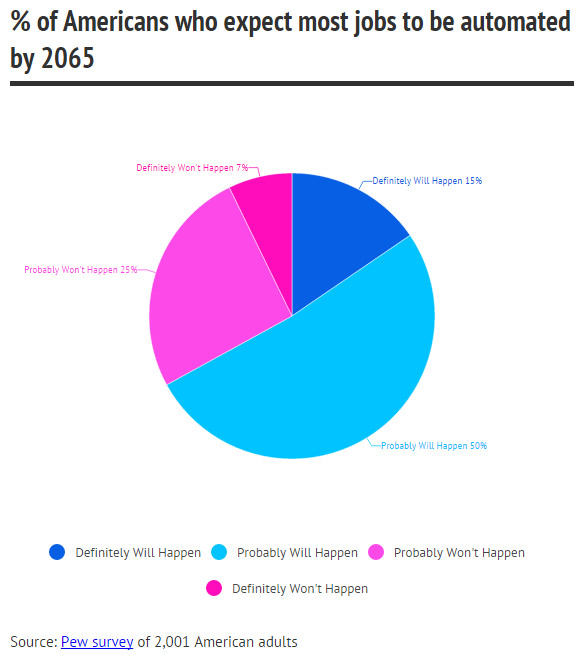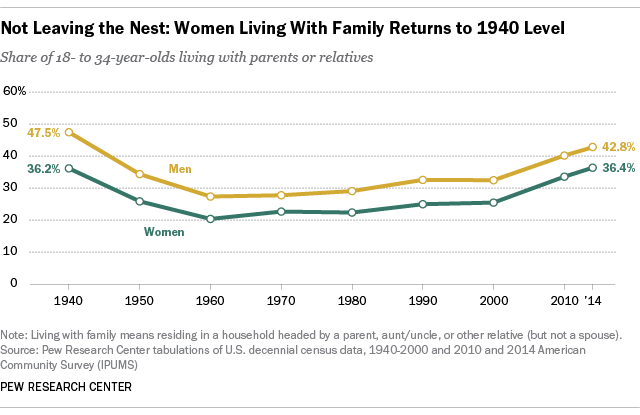
- Two-Thirds Of Americans Think Robots Will Take Our Jobs By 2065

http://www.fastcompany.com/3057695/the-future-of-work/two-thirds-of-americans-think-robots-will-take-our-jobs-by-2065 - Procurement Managers See Pressure to Reduce Costs Ramping Up
“One clear differentiator we saw in the research this year was the recognition of the value of improved market intelligence,” says Sawchuk. “Procurement leaders are realizing that higher-quality information can help them drive greater business value. Big data has been a game changer when it comes to customer analytics, offering an unprecedented ability to quickly model massive volumes of structured and unstructured data from multiple sources. But procurement’s lack of maturity in market intelligence is a significant obstacle that must be overcome.”
- Why Do Half of Millennials Still Live With Mommy and Daddy?

http://www.entrepreneur.com/article/272152 - Why Millennial Women Are Burning Out
A study from the University of Kansas found that women are burning out faster than men after looking at attrition rates of journalists. According to the research, women reported higher levels of overload and intention to leave the field.
The author of the study “examined the numbers through gender socialization theory, which claims that society puts certain expectations on people based on their gender from a very young age. Where women are more often expected to provide the majority of family care and raise children, men are expected to be the breadwinners and put work obligations before family. That was supported by the findings showing that women experience significantly higher rates of role overload, or feel that they are unable to complete their assigned duties in the work time allowed,” notes the University of Kansas study.
http://www.fastcompany.com/3057545/the-future-of-work/why-millennial-women-are-burning-out
- In pursuit of HIPAA, a new compliance gap arises
The operations team was leaning toward encrypting the hard drives, because options that are fairly easy to deploy are available. I agreed that it would be easy to do, but I objected that the method wouldn’t really be effective from a security perspective (and encryption is one thing that should be all about security). When you encrypt a hard drive, you are ensuring that anyone who comes into possession of that drive can’t access the data. In other words, the only way such encryption would protect the company would be if the hard drive were stolen. Now, the likelihood is infinitesimally small that a bad guy is going to determine where our highly secure data center is located; get past the security guards, man traps and biometrics; and then figure out which of the hundreds of drives to pull out.
- eWorld: technology and talent trends that will shake-up procurement
Technology and talent are increasingly part of the same sphere and this hit home over the course of the day. Artificial intelligence (AI) may reduce procurement specialists’ need for cognitive capabilities in analysing what the procurement outsourcing & consulting company, Optimum Procurement Group, call ‘hard trends’ – for example demographic data suggest the aging ‘baby boomers’ will increase the public spending in public health facilities. This would modify the capability requirements of procurement professionals.
Certain roles and skills could be redundant in the future, yet, AI are not sophisticated enough in dealing with soft trends – i.e. something that may happen depending on several interdependencies – which requires more complex and agile analysis. Qualitative and soft skills are increasingly important capabilities in the procurement professionals.
- HR Analytics: How Should Big Data Be Used in the Workplace?
When employers use predictive models to decide not to train people who, for instance, are on the verge of being either fired or awarded promotions, they’re basing their decisions on what an algorithm says may or may not happen, rather than what employees are actually doing. People are unpredictable, and unknown factors can influence outcomes. Decisions that affect people should be informed by data, but made by people.
- Metrics that count
In 2015, Gartner conducted a survey in conjunction with Supply Chain Management Review (SCMR) to address that question and to gain a better understanding of how manufacturing metrics are characterized, developed, and used to link manufacturing and supply chain performance.
http://www.scmr.com/article/metrics_that_count#When:20:26:46Z
Photo: Space X



